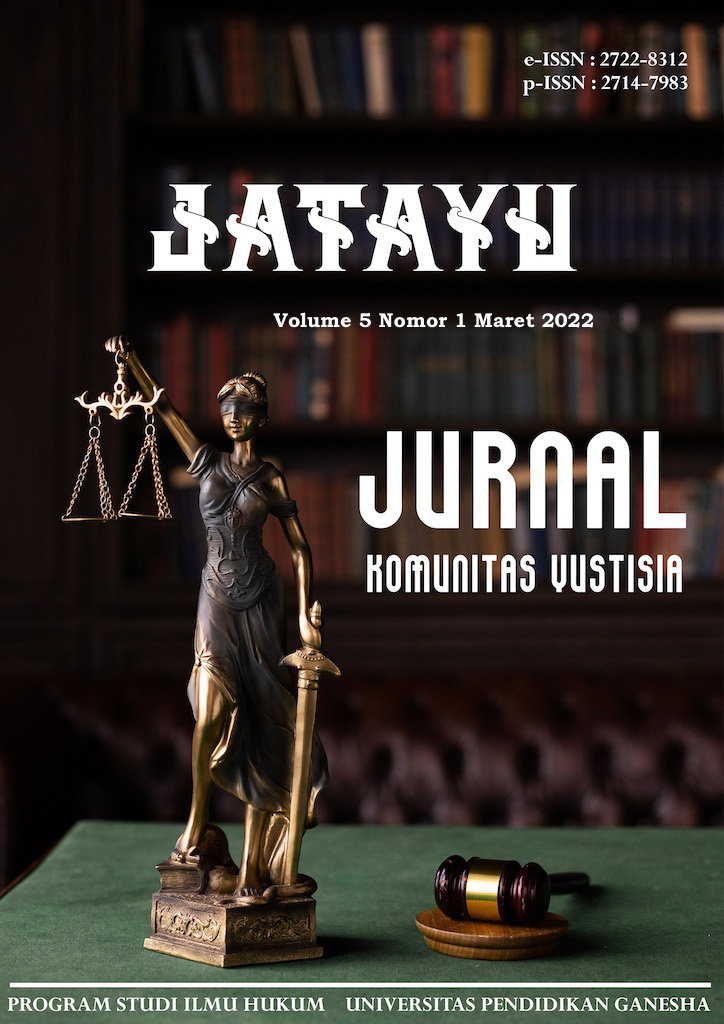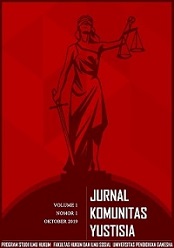PENGGUNAAN AKUN MEDIA SOSIAL SEBAGAI ALAT BUKTI ELEKTRONIK DALAM PROSES PENYIDIKAN
DOI:
https://doi.org/10.23887/jatayu.v5i2.51665Keywords:
Alat Bukti Elektronik, Akun Media Sosial, Pencemaran Nama BaikAbstract
Tujuan dari penelitian ini adalah untuk mengetahui kedudukan alat bukti elektronik berupa akun media sosial dalam proses penyidikan terhadap kasus tindak pidana pencemaran nama baik melalui media sosial serta mengetahui parameter dalam penentuan suatu informasi/dokumen elektronik berupa akun media sosial sebagai alat bukti dalam proses penyidikan. Jenis penelitian yang digunakan adalah penelitian hukum empiris dengan sifat penelitian deskriptif. Lokasi penelitian ini dilakukan di Kabupaten Buleleng. Teknik pengumpulan data yang digunakan adalah dengan cara observasi, studi dokumen, dan wawancara. Teknik penentuan sampel yang digunakan adalah teknik Non Probability Sampling dan penentuan subjeknya menggunakan teknik Purposive Sampling selanjutnya teknik pengolahan dan analisis data dilakukan secara kualitatif. Hasil penelitian menunjukan bahwa kedudukan akun media sosial terhadap kasus pencemaran nama baik melalui media sosial adalah sah sebagai alat bukti elektronik hal ini diatur dalam Pasal 5 ayat (1) dan (2) Undang-Undang Nomor 19 Tahun 2016 tentang Perubahan Atas Undang-Undang Nomor 11 Tahun 2008 tentang Informasi dan Transaksi Elektronik. Parameter yang digunakan dalam menentukan suatu informasi/dokumen elektronik berupa akun media sosial agar dapat digunakan sebagai alat bukti dalam proses penyidikan, harus memenuhi persyaratan formil dan persyaratan materil, persyaratan formil diatur dalam Pasal 5 ayat (4) Undang-Undang Nomor 19 Tahun 2016 tentang Perubahan Atas Undang-Undang Nomor 11 Tahun 2008 tentang Informasi dan Transaksi Elektronik sedangkan persyaratan materiil diatur dalam Pasal 6, Pasal 15, dan Pasal 16 Undang-Undang Nomor 19 Tahun 2016 tentang Perubahan Atas Undang-Undang Nomor 11 Tahun 2008 tentang Informasi dan Transaksi Elektronik.
Downloads
Published
Issue
Section
License

This work is licensed under a Creative Commons Attribution-ShareAlike 4.0 International License.
Authors who publish with this journal agree to the following terms: Authors retain copyright and grant the journal right of first publication with the work simultaneously licensed under a Creative Commons Attribution License that allows others to share the work with an acknowledgement of the work's authorship and initial publication in this journal. Authors are able to enter into separate, additional contractual arrangements for the non-exclusive distribution of the journal's published version of the work (e.g., post it to an institutional repository or publish it in a book), with an acknowledgement of its initial publication in this journal. Authors are permitted and encouraged to post their work online (e.g., in institutional repositories or on their website) prior to and during the submission process, as it can lead to productive exchanges, as well as earlier and greater citation of published work (See The Effect of Open Access). Authors who publish with this journal agree to the following terms: Authors retain copyright and grant the journal right of first publication, with the work [SPECIFY PERIOD OF TIME] after publication simultaneously licensed under aCreative Commons Attribution License that allows others to share the work with an acknowledgement of the work's authorship and initial publication in this journal. Authors are able to enter into separate, additional contractual arrangements for the non-exclusive distribution of the journal's published version of the work (e.g., post it to an institutional repository or publish it in a book), with an acknowledgement of its initial publication in this journal. Authors are permitted and encouraged to post their work online (e.g., in institutional repositories or on their website) prior to and during the submission process, as it can lead to productive exchanges, as well as earlier and greater citation of published work (See The Effect of Open Access).






